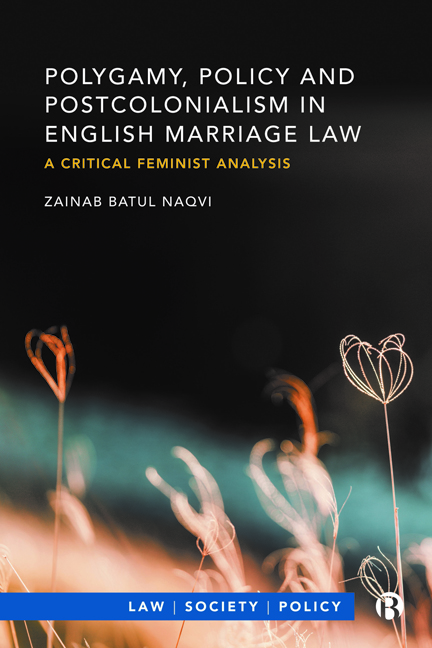Book contents
- Frontmatter
- Dedication
- Contents
- Series Editor’s Preface
- List of Cases
- List of Legislation
- Acknowledgements
- 1 Introduction: Polygamy, Law and Women’s Lives
- 2 Consciousness and Disruption in Critical Postcolonial Feminism
- 3 Polygamy in England: Tracing Legal Developments
- 4 History and Conflict of Laws in Overseas Polygamy
- 5 Tensions in Religion and Culture
- 6 Complicating Harm and Gender Equality
- 7 Religion, Recognition and Marriage Law
- 8 Final Thoughts and Reflections
- References
- Index
2 - Consciousness and Disruption in Critical Postcolonial Feminism
Published online by Cambridge University Press: 17 January 2024
- Frontmatter
- Dedication
- Contents
- Series Editor’s Preface
- List of Cases
- List of Legislation
- Acknowledgements
- 1 Introduction: Polygamy, Law and Women’s Lives
- 2 Consciousness and Disruption in Critical Postcolonial Feminism
- 3 Polygamy in England: Tracing Legal Developments
- 4 History and Conflict of Laws in Overseas Polygamy
- 5 Tensions in Religion and Culture
- 6 Complicating Harm and Gender Equality
- 7 Religion, Recognition and Marriage Law
- 8 Final Thoughts and Reflections
- References
- Index
Summary
This chapter sets out the foundation for my analysis of responses to polygamous marriages in English law and the courts. I draw from the insights provided by critical postcolonial feminist literature and the critiques of orientalism and imperialism to shed light on the law and women's experiences and attitudes concerning polygamous marriages. After providing a brief overview of the relevance of critical postcolonial theory and feminist thought, I employ two tools from this approach to advance understandings of polygamous marriage regulation in English law. The first of these tools, historical consciousness, is especially useful for a relationship practice that has been around for thousands of years, like polygamous marriage. Based on this historically conscious approach, I show that current legal and judicial attitudes and approaches to polygamous marriage remain influenced by and entrenched in colonialist attitudes towards this relationship and the women who practise it. The law is outdated and needs to be reconsidered for the present day.
The second tool pertains to the challenging or disruption of dominant narratives and discourses. Using this tool, I examine the key concepts of orientalism and imperialism and show that progress has been made in the literature to define these in a more sophisticated manner. However, we need to do more to understand how they manifest and operate in the contemporary context so that we can see how they influence the ways polygamous marriage is framed in law and in real women's lives. Critical postcolonial studies, in its historically conscious way, has exposed orientalism and imperialism very clearly as powerful historical discourses, but less has been done to construct alternative accounts of these concepts which speak from the perspective of the colonised or those subjected to these discourses. Critical perspectives on the colonial demonstrate the potential to build these alternative accounts by challenging the dominant narratives of what these concepts mean and do to real women. I draw on this to complicate the current legal approaches to polygamy, which are rooted in colonialist orientalism and imperialism.
Postcolonial feminism is a critical movement disrupting dominant discourses and narratives that oppress those subjected to and by the ‘colonial’. Taking this historically conscious and disruptive path, it is these voices of the marginalised and the ignored that I seek to centre in this work.
- Type
- Chapter
- Information
- Polygamy, Policy and Postcolonialism in English Marriage LawA Critical Feminist Analysis, pp. 23 - 45Publisher: Bristol University PressPrint publication year: 2023



